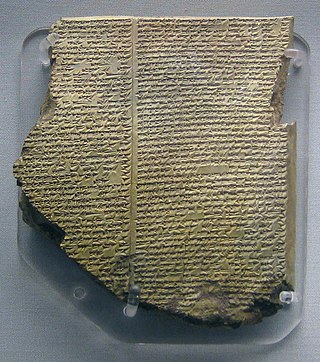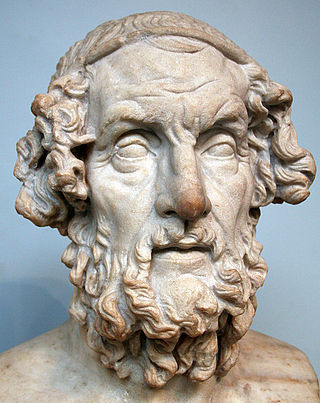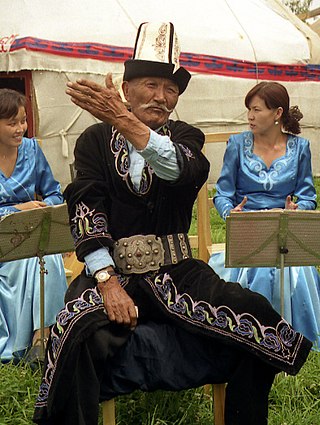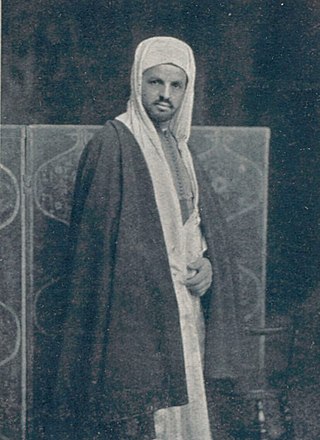Related Research Articles

An epic poem, or simply an epic, is a lengthy narrative poem typically about the extraordinary deeds of extraordinary characters who, in dealings with gods or other superhuman forces, gave shape to the mortal universe for their descendants.

Homer was an Ancient Greek poet who is credited as the author of the Iliad and the Odyssey, two epic poems that are foundational works of ancient Greek literature. Homer is considered one of the most revered and influential authors in history.

Oral tradition, or oral lore, is a form of human communication in which knowledge, art, ideas and culture are received, preserved, and transmitted orally from one generation to another. The transmission is through speech or song and may include folktales, ballads, chants, prose or poetry. The information is mentally recorded by oral repositories, sometimes termed "walking libraries", who are usually also performers. Oral tradition is a medium of communication for a society to transmit oral history, oral literature, oral law and other knowledge across generations without a writing system, or in parallel to a writing system. It is the most widespread medium of human communication.

Kabyle or Kabylian is a Berber language (tamazight) spoken by the Kabyle people in the north and northeast of Algeria. It is spoken primarily in Kabylia, east of the capital Algiers and in Algiers itself, but also by various groups near Blida, such as the Beni Salah and Beni Bou Yaqob.

Berberism is a Berber ethnonationalist movement, that started mainly in Kabylia (Algeria) and Morocco during the French colonial era with the Kabyle myth and was largely driven by colonial capitalism and France's divide and conquer policy. The Berberist movement originally manifested itself as anti-Arab racism, Islamophobia, and Francophilia, that was sanctioned and sponsored by French colonial authorities. The movement later spread to other Berber communities in the Maghreb region of North Africa and was facilitated by colonial policies such as the Berber Dahir. The Berberist movement in Algeria and Morocco is in opposition to cultural Arabization, pan-Arabism and Islamism.
"Know thyself" is a philosophical maxim which was inscribed upon the Temple of Apollo in the ancient Greek precinct of Delphi. The best-known of the Delphic maxims, it has been quoted and analyzed by numerous authors throughout history, and has been applied in many ways. Although traditionally attributed to the Seven Sages of Greece, or to the god Apollo himself, the inscription likely had its origin in a popular proverb.

Wisdom literature is a genre of literature common in the ancient Near East. It consists of statements by sages and the wise that offer teachings about divinity and virtue. Although this genre uses techniques of traditional oral storytelling, it was disseminated in written form.

The Berber Spring was a period of political protest and civil activism in 1980, claiming recognition of the Berber identity and language in Algeria, with events mainly taking place in Kabylia and Algiers.

Si Mohand ou-Mhand n At Hmadouch, also known as Si Mhand, was a widely known Berber poet from Kabylie in Algeria. Called the "Kabyle Verlaine" by French scholars, his works were translated by fellow Algerians Mouloud Feraoun, Mouloud Mammeri and Boulifa and one of the translations was Les poémes de Si-Mohand (1960). Due to difference of information and sources, some details of his life are not clearly known.

The Kabyle people are a Berber ethnic group indigenous to Kabylia in the north of Algeria, spread across the Atlas Mountains, 160 kilometres (100 mi) east of Algiers. They represent the largest Berber population of Algeria and the second largest in North Africa.

Mouloud Mammeri was an Algerian writer, anthropologist and linguist.
Ethiopian philosophy or Abyssinian philosophy is the philosophical corpus of the territories of present-day Ethiopia and Eritrea. Besides via oral tradition, it was preserved early in written form through Ge'ez manuscripts. This philosophy occupies a unique position within African philosophy.

Algerian literature has been influenced by many cultures, including the ancient Romans, Arabs, French, Spanish, and Berbers. The dominant languages in Algerian literature are French and Arabic.
Académie Berbère d'Échange et de Recherches Culturels, usually shortened to Académie Berbère or the Berber Academy was a Paris-based Kabyle cultural association formed in 1966 and officially authorized in March 1967 with the objective of raising Berber consciousness. The association was renamed Agraw Imazighen in Tamazight in 1969.
Kabyle grammar is the set of structural rules and regulations included in the Kabyle language, ranging from words to phrases, to punctuation, and sentences.
Indigenous cultures in North America engage in storytelling about morality, origin, and education as a form of cultural maintenance, expression, and activism. Falling under the banner of oral tradition, it can take many different forms that serve to teach, remember, and engage Indigenous history and culture. Since the dawn of human history, oral stories have been used to understand the reasons behind human existence. Today, Indigenous storytelling is part of the broader indigenous process of building and transmitting indigenous knowledge.

Tassadit Yacine-Titouh is an Algerian anthropologist specialising in Berber culture.
Riddles have at times been an important literary or folk-literary form in South Asia. Indeed, it is thought that the world's earliest surviving poetic riddles are those found in the Sanskrit Rigveda.

Azouaou Mammeri, also known as Si Azouaou Mammeri, was an Algerian painter born in 1890 or 1892 in the village of Taourirt-Mimoun which was part of Aït Yenni. He died on September 17, 1954, in Aït Yenni.
References
- 1 2 3 4 Mammeri, Mouloud (1980). Poèmes kabyles anciens.
- ↑ Mammeri, Mouloud; Bourdieu, Pierre (2004). "Dialogue on oral poetry". Ethnography. 5 (4): 511–551. doi:10.1177/1466138104048827. ISSN 1466-1381.